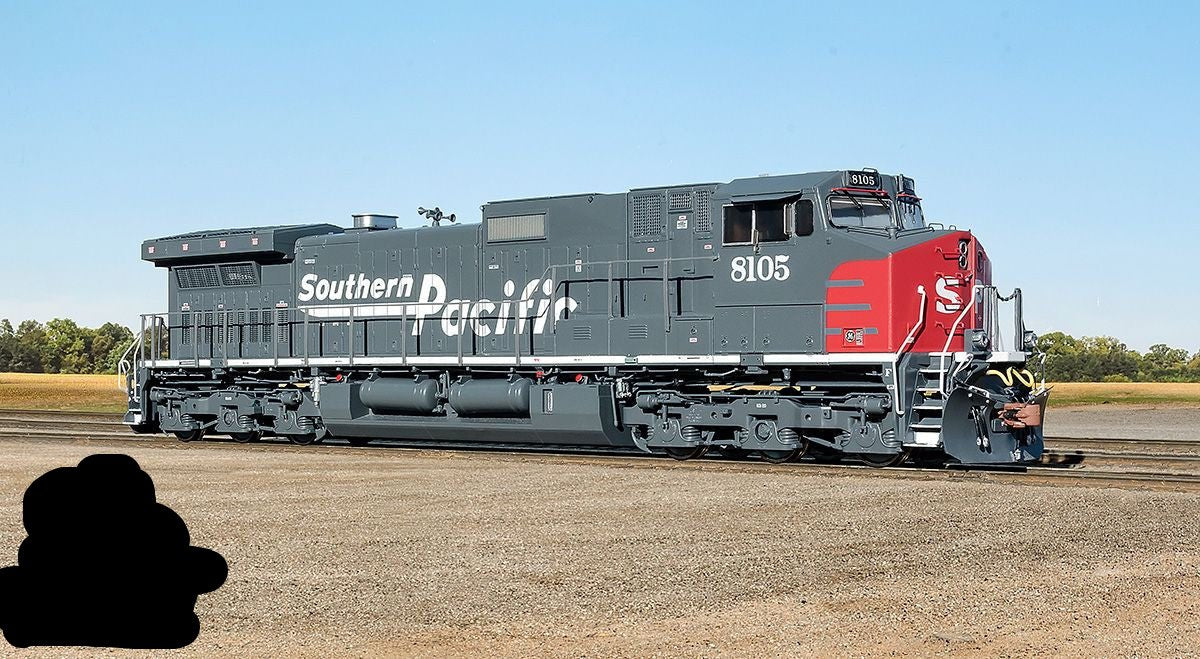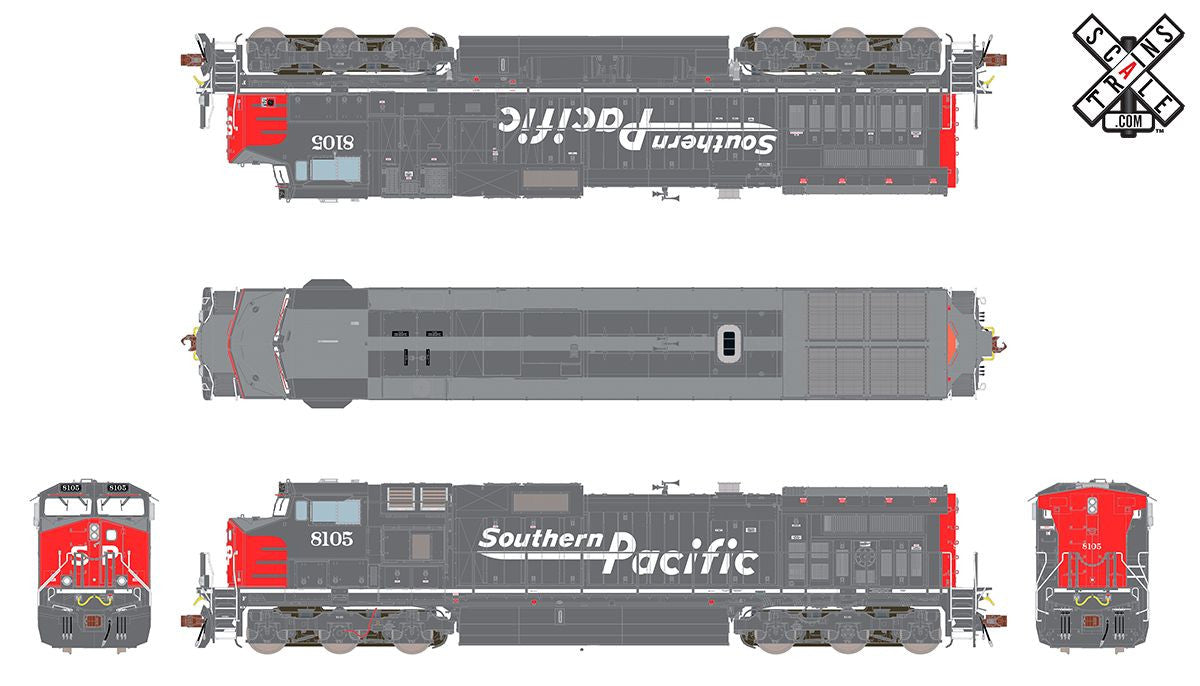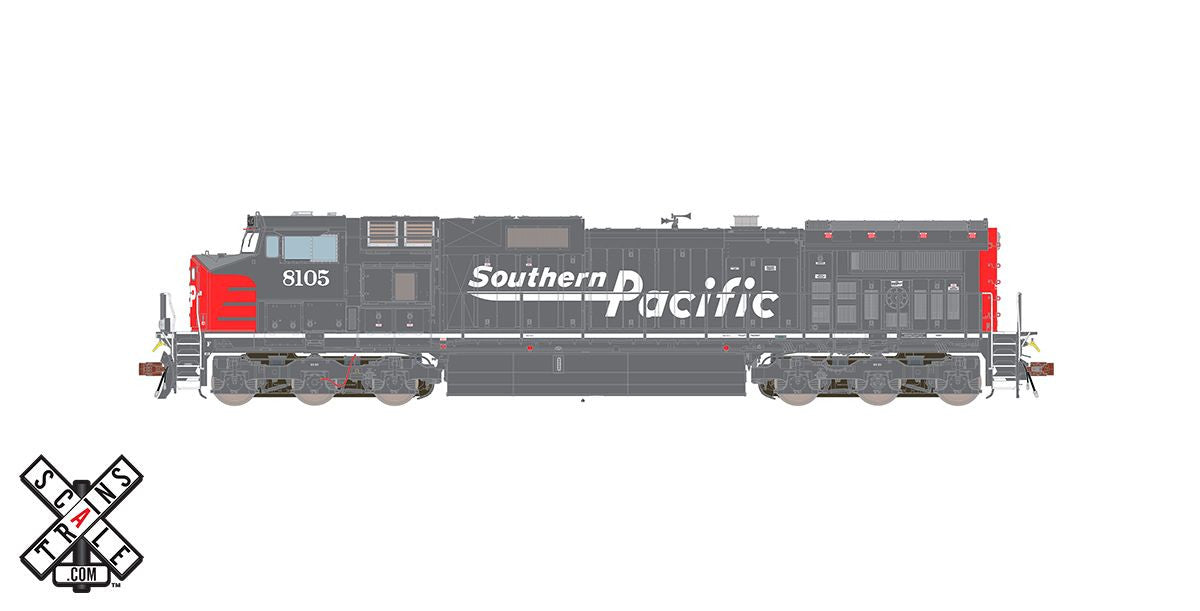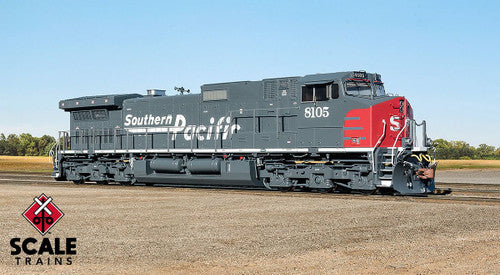Scaletrains SXT33496 GE Dash 9 - SP Southern Pacific/As Delivered #8168 ESU v5.0 DCC & Sound HO Scale
Scaletrains SXT33496 GE Dash 9 - SP Southern Pacific/As Delivered #8168 ESU v5.0 DCC & Sound HO Scale is backordered and will ship as soon as it is back in stock.
Couldn't load pickup availability
Description
Description
Scaletrains SXT33496 GE Dash 9 - SP Southern Pacific/As Delivered #8168 ESU v5.0 DCC & Sound. Please note pictures may show a different road number.
With railroad, road number, and era specific details, our Rivet Counter series DASH-9 is the definitive model of this popular GE locomotive. In our continuing effort to push the boundaries of realism in model railroading, the Rivet Counter DASH-9 features operating LED front, rear, and side walkway lights.
Road Number-Specific ScaleTrains
- Era: late 1994 to late 1996
- Series SP 8100-8200, built May through December 1994
- Fully-assembled
- Multiple road numbers
- No ground lights (prototype not equipped)
- Operating LED front, rear, and side walkway lights*
- Operating LED front deck-mounted alternating ditch lights**
- LED-illuminated high-mount number boards*
- Tall snowplow with open doors and grab irons
- Semi-scale coupler buffer equipped with durable metal semi-scale Type E knuckle couplers
- 5-step stepwells with see-through steps
- Walkway with front anticlimber
- GE “nub” pattern walkway tread
- Narrow profile end handrails
- Front nose headlight
- Nose door with window
- Two-piece nose top grab irons
- Standard electrical cabinet access doors
- Battery cabinet access door with latch
- GE safety cab with three (3) side windows
- Cab interior with detailed back wall and front dash, high-back seats, conductor’s work station, and engineer’s desktop controls
- Tinted cab side windows
- Medium mirror mounted in front of sliding cab side windows on both sides; additional small mirror on right side
- Large Sinclair “ice skate” communication antenna and small Sinclair “ice skate” End of Train (EOT) telemetry antenna
- Electrical cabinet with drop grab irons on rear
- Prime Manufacturing PM5191 HVAC unit
- Dynamic brake intake panels
- Alternating reinforcement ribs under dynamic brake intake grilles
- Early dynamic brake exhaust
- Early curved engine cab profile
- Lost-wax brass cast Nathan AirChime P3 (P24R1 configuration) horn mounted on engine cab
- Early flanged exhaust stack housing
- “Bathtub” exhaust silencer
- 26 individually-applied etched metal see-through radiator intake and exhaust grilles on sides and top of radiator compartment
- Early radiator door grille pattern (all the same height)
- Standard brake wheel
- Low-mounted rear sand fill
- Early lifting lugs on ends of radiator wings
- Accurately profiled frame with separately-applied plumbing and traction motor cabling
- Late Hi-Ad trucks with non-cantilevered struts on all four sideframes
- Rotating axle bearing caps
- Speed recorder on left side second axle
- Dual Graham-White (Prime) 975-075 Air Filters
- Graham-White 975-100 “Twin Tower” Air Filter Dryer
- 5,000-gallon fuel tank with vertical weld seams
- Dual fuel fills per side
- Round and vertical analog fuel gauges
- Fuel tank mounted steel bell
- Separate air tanks with upper mounting brackets
- Early, square handbrake chain bracket
- SP-style coupler knuckle boxes on rear pilot face
- Factory-applied detail parts: wire grab irons, spare knuckles, trainline hoses with silver gladhands, 3-hose MU clusters with silver gladhands, uncoupling levers, windshield wipers, mirrors, sunshades, and more
- Motor with 5-pole, skew-wound armature
- Dual flywheels
- All-wheel drive
- All-wheel electrical pick-up
- Directional LED headlights
- Printing and lettering legible under magnification
- Operates on Code 70, 83, and 100 rail
- Packaging safely stores model
- Minimum Radius: 18”
- Recommended Radius: 22”
DCC & sound equipped locomotives also feature:
- ESU-LokSound 5 DCC and Sound decoder with “Full Throttle”
- Two (2) cube-type speakers
- Accurate FDL-16 prime mover and auxiliary sounds, horn, bell, and more
- ESU-designed PowerPack with two (2) super capacitors***
- Operates on both DC and DCC layouts
General Electric wrestled the title of top domestic locomotive builder from EMD during the late 1980s with their Dash-8 series. GE once again positioned themselves to shakeup the locomotive world yet again less than a decade later. Entering the 1990s, GE completely revamped their locomotive lineup by utilizing customer feedback, learning from experience gained from previous locomotive series, and improvements in technology.
A single C44-9W demonstrator unit, numbered 8601, made its debut in 1993 (and later became C&NW 8601). While similar at first glance to predecessor models like the C40-8 and C40-8W, the Dash-9 series featured a few notable physical differences. Built on a slightly longer platform that allowed for a massive 5,000 gallon fuel tank, Dash-9s also featured thicker radiator “wings” at the rear of the carbody. This is usually the quickest way to differentiate them from previous models.
Thanks to its long production span and customer options, small detail differences could be noted between various customer orders. This includes changes with HVAC system vendors (the large “A/C” box behind the cab on the conductors side), engine cab profile, radiator lifting lugs, hood end, trucks, fuel tank, stepwells, operator’s cab, and even handrail profiles.
The C44-9W proved to be extremely popular over its production span with over 3,500 locomotives being sold new to ATSF, BC Rail, BNSF, CN, C&NW, NS (including 100 spartan cab equipped versions, nicknamed “Top Hats”), QNS&L, SP, and UP.
NS was an important customer with over 1,000 Dash-9s on the roster. They preferred customized models in the form of 100 spartan-cab equipped, 4,000hp C40-9s (nicknamed “Top Hats”) and numerous examples of safety cab-equipped versions rated at 4,000hp, and designated as C40-9Ws. All C40-9/Ws would eventually be uprated to 4,400hp with their designations changed accordingly.
Over the years, the Dash-9s could be found in a variety of assignments. Santa Fe’s C44-9Ws were delivered in the famed red and silver “Superfleet” scheme and could be found hurtling across the southwest with hot piggyback trailer and container trains in tow.
Southern Pacific’s units were some of the first new six-axle power on the beleaguered railroad’s roster in more than a decade. They were pressed into a variety of assignments ranging from hot intermodal trains to coal and iron ore drags.
Chicago & North Western’s units made their debut in flashy “lightning stripe” livery and handled numerous assignments during their brief tenure before being absorbed by Union Pacific
The Dash-9 series remained in production until the early 2000s when it was superseded by GE’s “Evolution Series” ES40/44-series models. Age has begun to catch up with the earliest C44-9W and related models so some railroads are storing and/or rebuilding these veteran units. NS’s oldest units, the spartan-cab C40-9s, are being rebuilt with the latest GE safety cab for increased crew comfort and safety plus AC-traction for increased performance.
Originally built in the early 1990s, some of BNSF’s former Santa Fe fleet are also in the process of being rebuilt with AC-traction to extend their service lives and improve their performance.
Built over a long timeframe, and proving to be a solid, upgradeable platform, the C44-9W family of locomotives including rebuilds is sure to remain a fixture on today’s railroads for the foreseeable future.
Specifications
Specifications
-
Scale
-
Product Type-
-
Height
-
Width
-
Depth









